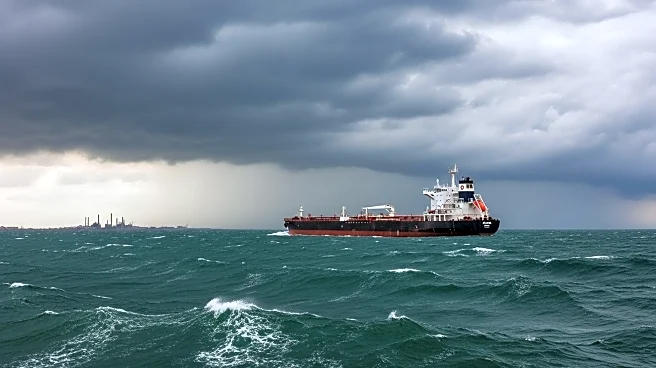What is the story about?
What's Happening?
The U.S. has imposed new sanctions on Iranian petroleum exports, targeting the Rizhao Shihua Crude Oil Terminal in China, which is partly owned by Sinopec. This terminal handles a significant portion of Sinopec's crude oil imports. The sanctions are part of ongoing efforts by the U.S. to restrict Iran's oil trade, complicating Sinopec's operations and U.S.-China relations. The sanctions come ahead of planned talks between President Trump and President Xi Jinping. The Rizhao terminal, located in Shandong province, is crucial for Sinopec's logistics, and the sanctions may force Sinopec to redirect shipments to other facilities.
Why It's Important?
These sanctions could disrupt Sinopec's supply chain, affecting its ability to process crude oil at major refineries connected to the Rizhao terminal. The move may lead to increased operational costs and logistical challenges for Sinopec, potentially impacting China's oil supply and refining capacity. The sanctions also reflect heightened tensions between the U.S. and China, with potential implications for global oil markets and international trade relations. The broader impact could include shifts in oil prices and trade dynamics, influencing global economic stability.
What's Next?
Sinopec may need to explore alternative ports for oil imports, such as Ningbo or Qingdao, to mitigate the impact of the sanctions. The company might also increase throughput at nearby plants to compensate for potential production cuts. The situation could lead to further diplomatic negotiations between the U.S. and China, as both countries navigate the complexities of trade and international relations. The sanctions may prompt Sinopec to adjust its strategic operations and explore new supply chains.
Beyond the Headlines
The sanctions highlight the geopolitical complexities of global oil trade, where economic policies intersect with international diplomacy. The targeting of Sinopec underscores the strategic importance of energy resources in U.S.-China relations. The situation may also raise ethical questions about the use of economic sanctions as a tool for political leverage, affecting not only corporate entities but also broader societal and economic systems.















